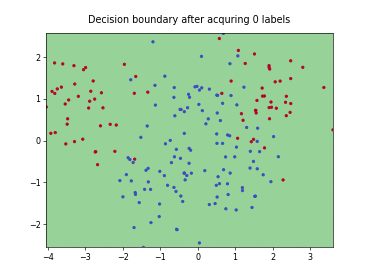skactiveml.pool.Quire#
- class skactiveml.pool.Quire(classes, lmbda=1.0, metric='rbf', metric_dict=None, missing_label=nan, random_state=None)[source]#
Bases:
SingleAnnotatorPoolQueryStrategyImplementation of the AL strategy “QUerying Informative and Representative Examples” (QUIRE for short) [1].
- Parameters
- classes: array-like, shape (n_classes)
Array of class labels.
- lmbdafloat, default=1.0
Controls informativeness (high) and representativeness (low). Values must be greater than 0.
- metricstr or callable, default=’rbf’
The metric must a be a valid kernel defined by the function sklearn.metrics.pairwise.pairwise_kernels or ‘precomputed’.
- metric_dictdict, default=None
Any further parameters are passed directly to the metric function.
- missing_labelscalar or string or np.nan or None, default=MISSING_LABEL
Value to represent a missing label.
- random_stateint or np.random.RandomState, optional (default=None)
The random state to use.
- References
- ———
- [1] Huang, S. J., Jin, R., & Zhou, Z. H. (2010). Active learning by
querying informative and representative examples. Advances in neural information processing systems, 23.
Methods
Get metadata routing of this object.
get_params([deep])Get parameters for this estimator.
query(X, y[, candidates, batch_size, ...])Determines for which candidate samples labels are to be queried.
set_params(**params)Set the parameters of this estimator.
Attributes
- METRICS = ['additive_chi2', 'chi2', 'cosine', 'linear', 'poly', 'polynomial', 'rbf', 'laplacian', 'sigmoid', 'precomputed']#
- get_metadata_routing()#
Get metadata routing of this object.
Please check User Guide on how the routing mechanism works.
- Returns
- routingMetadataRequest
A
MetadataRequestencapsulating routing information.
- get_params(deep=True)#
Get parameters for this estimator.
- Parameters
- deepbool, default=True
If True, will return the parameters for this estimator and contained subobjects that are estimators.
- Returns
- paramsdict
Parameter names mapped to their values.
- query(X, y, candidates=None, batch_size=1, return_utilities=False)[source]#
Determines for which candidate samples labels are to be queried.
- Parameters
- Xarray-like of shape (n_samples, n_features) or shape
- (n_samples, n_samples) if metric == ‘precomputed’
Training data set, including the labeled and unlabeled samples.
- yarray-like of shape (n_samples)
Labels of the training data set, including unlabeled ones indicated by self.missing_label.
- candidatesNone or array-like of shape (n_candidates), dtype=int,
- default=None
If candidates is None, the unlabeled samples from (X,y) are considered as candidates. If candidates is of shape (n_candidates) and of type int, candidates is considered as the indices of the samples in (X,y). The option candidates with shape (n_candidates, n_features) is not supported.
- batch_sizeint, default=1
The number of samples to be selected in one AL cycle.
- return_utilitiesbool, default=False
If true, also return the utilities based on the query strategy.
- Returns
- query_indicesnumpy.ndarray of shape (batch_size)
The query_indices indicate for which candidate sample a label is to queried, e.g., query_indices[0] indicates the first selected sample. If candidates is None or of shape (n_candidates), the indexing refers to samples in X.
- utilitiesnumpy.ndarray of shape (batch_size, n_samples) or
numpy.ndarray of shape (batch_size, n_candidates) The utilities of samples after each selected sample of the batch, e.g., utilities[0] indicates the utilities used for selecting the first sample (with index query_indices[0]) of the batch. Utilities for labeled samples will be set to np.nan. If candidates is None or of shape (n_candidates), the indexing refers to samples in X.
- set_params(**params)#
Set the parameters of this estimator.
The method works on simple estimators as well as on nested objects (such as
Pipeline). The latter have parameters of the form<component>__<parameter>so that it’s possible to update each component of a nested object.- Parameters
- **paramsdict
Estimator parameters.
- Returns
- selfestimator instance
Estimator instance.
